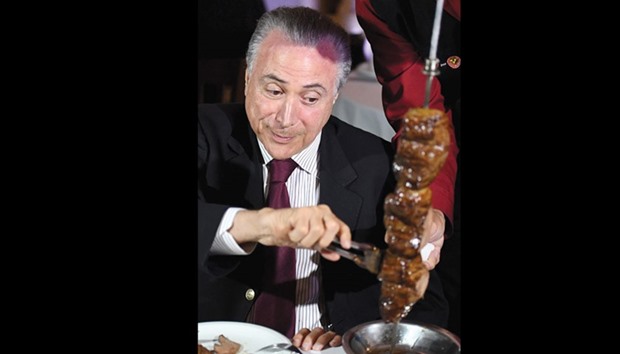Fallout from a corruption scandal in Brazil’s massive meat industry spread yesterday, with China and South Korea suspending some imports and the European Union mulling action, hitting shares of the world biggest poultry producer BRF SA.
With other suspensions expected to follow, the Brazilian police operation codenamed “Weak Flesh” could deal a heavy blow to one of the few sectors of Latin America’s largest economy that has thrived during a two-year recession.
China, which accounted for nearly one-third of the Brazilian industry’s $13.9bn in exports last year, decided to suspend imports of all meat products from Brazil as a precautionary measure after police on Friday accused companies of widespread bribery of health inspectors to hide unsanitary conditions.
South Korea’s agriculture ministry said in a statement that it would tighten inspections of imported Brazilian chicken meat and temporarily bar sales of chicken products by BRF, the world’s largest poultry producer.
More than 80% of the 107,400 tonnes of chicken that South Korea imported last year came from Brazil, and BRF supplied almost half of that.
Police on Friday named BRF, JBS SA and dozens of smaller rivals in a two-year probe into how meatpackers allegedly paid off inspectors and politicians to overlook practices including processing rotten meat and shipping exports with traces of salmonella.
The companies have strongly denied any wrongdoing.
Authorities have emphasised that no cases of illness have been linked to the investigation.
To minimise the scandal, President Michel Temer said the probe involved only 21 of Brazil’s more than 4,800 meat processing units.
“Agribusiness for us in Brazil is incredibly important and cannot be devalued by a small group, by a minor thing that can be investigated, regulated and punished if needed,” Temer told business leaders in Sao Paulo.
“But it cannot compromise the entire system that we have created through the years.”
However, Francisco Turra, head of Brazilian beef producers association ABPA, told a separate news conference that the scandal had put the entire sector in jeopardy and “destroyed” a hard-fought image of quality products.
Common shares of BRF and JBS fell as much as 10% early yesterday after posting heavy losses on Friday.
However, JBS recovered to trade up 2% by noon (1500GMT) as investors bet the scandal would have less effect on the world’s largest meatpacker, while BRF was still down 2%.
BRF could prove more vulnerable to the scandal since a larger share of its operations are physically based in Brazil, while JBS derives most of its sales from abroad, according to a report by Goldman Sachs analysts led by Luca Cipiccia.
Shares of Minerva SA and Marfrig Global Foods SA, which are not involved in the investigations, also fell as traders fretted over the possibility of further import bans.
The scandal “could be enough to compromise temporarily Brazilian protein’s acceptance worldwide”, Credit Suisse Securities analyst Victor Saragiotto wrote in a Monday note to clients.
Chile is temporarily banning imports of beef from Brazil, the agriculture ministry said yesterday.
The European Commission said it would monitor meat imports from Brazil and deny any companies involved in a meat scandal there access to the European Union market, a spokesman said.
The commission said the scandal would not affect negotiations between the European Union and South American bloc Mercosur about agreements on free trade.
On the streets of Rio de Janeiro, Brazil’s second-largest city, the scandal left many consumers in doubt.
“My freezer at home is full of meat, and I don’t know what to do,” said Maria Fonseca, a saleswoman. “Should I eat it or just throw it all away? It is an enormous waste.
“If I lived in the countryside, I’d start raising my own cows and chickens!”

Brazilian President Michel Temer eats at a steak house in Brasilia after meeting with ambassadors from countries that import Brazilian meat.
